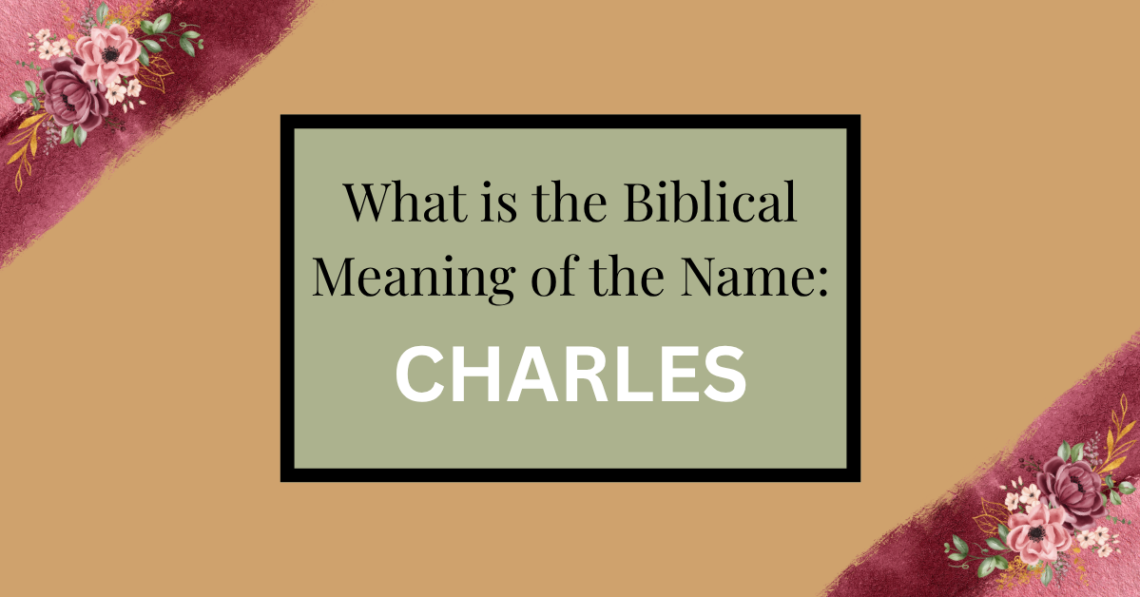Names are more than just words—they carry identity, history, and purpose. The name Charles is a classic, strong, and timeless name, often associated with leadership, dignity, and influence. While Charles does not appear directly in the Bible, its meaning and historical associations carry qualities that align beautifully with biblical principles, offering spiritual encouragement to those who bear the name.
Origin and Meaning of Charles
The name Charles comes from the Germanic name Karl, which means “free man” or “manly.” Over centuries, it has become widely used in many cultures, often associated with royalty and leadership. Kings, nobles, and prominent figures throughout history have carried the name Charles, adding to its sense of authority and strength.
From a spiritual perspective, the meaning “free man” connects to biblical themes of freedom, courage, and living in God’s grace. It is a reminder that in Christ, we are truly free—free from sin, fear, and the burdens that weigh us down.
Charles and Biblical Themes
Even though the name Charles does not appear in Scripture, several biblical themes closely align with its meaning and associations:
1. Freedom in Christ
The essence of Charles as a “free man” resonates deeply with passages about spiritual freedom. In Galatians 5:1 (ESV), Paul writes:
“For freedom Christ has set us free; stand firm therefore, and do not submit again to a yoke of slavery.”
This verse highlights the ultimate freedom we have in Christ, the freedom to live without the bondage of sin, fear, or worldly pressures. A person named Charles can reflect this freedom through faith, courage, and moral integrity.
2. Strength and Leadership
Historically, the name Charles has been associated with leaders and kings. Similarly, Scripture often emphasizes strength, courage, and righteous leadership. Joshua 1:9 (ESV) encourages us:
“Have I not commanded you? Be strong and courageous. Do not be frightened, and do not be dismayed, for the Lord your God is with you wherever you go.”
Those bearing the name Charles can draw inspiration from this call to lead with courage and integrity, relying on God’s strength to guide their actions.
3. Noble Character
The legacy of kings named Charles reminds us of the importance of noble character. In the Bible, nobility is often associated with humility, justice, and a heart devoted to God. Proverbs 20:7 (ESV) says:
“The righteous who walks in his integrity—blessed are his children after him!”
A person named Charles can embody this sense of nobility by living a life of integrity, kindness, and faithfulness to God.
Charles as a Spiritual Reflection
For Christians, the name Charles can serve as a spiritual reminder of our calling in Christ. Being a “free man” points to both the freedom we have and the responsibility that comes with it. With freedom comes the call to:
- Live righteously: Walking in truth and honoring God in all actions.
- Lead with integrity: Whether in family, work, or community, reflecting Christlike character.
- Serve faithfully: Using gifts and talents to bless others and advance God’s Kingdom.
- Rely on God: Recognizing that true strength and freedom come from Him, not from worldly power.
In this way, the name Charles can inspire those who bear it to reflect God’s character in every area of life.
Historical and Modern Associations
Beyond its biblical connections, the name Charles carries historical significance. Many kings and leaders have borne this name, including Charles the Great (Charlemagne), who united much of Europe and encouraged learning and faith during his reign. While earthly kings are not perfect examples, their legacy reinforces the idea of strength, leadership, and responsibility—qualities that mirror the biblical call to lead with humility and wisdom.
Today, Charles remains a popular and respected name. Parents who choose it often do so for its strength, classic appeal, and timeless quality. For Christians, it also serves as a reminder of the spiritual freedom we have in Christ and the call to live a life that honors God.
Biblical Verses to Reflect On
Here are some key verses that align with the meaning and spiritual significance of Charles:
- Galatians 5:1 (ESV): “For freedom Christ has set us free; stand firm therefore, and do not submit again to a yoke of slavery.”
- Joshua 1:9 (ESV): “Have I not commanded you? Be strong and courageous. Do not be frightened, and do not be dismayed, for the Lord your God is with you wherever you go.”
- Proverbs 20:7 (ESV): “The righteous who walks in his integrity—blessed are his children after him!”
- 1 Peter 2:16 (ESV): “Live as free people, but do not use your freedom as a cover-up for evil, but live as servants of God.”
These verses highlight the qualities of freedom, courage, integrity, and service—all central to the meaning of Charles.
Final Thoughts
The name Charles is more than just a classic and strong name. It is a name that represents freedom, leadership, and nobility—qualities that can be lived out in faith. While it does not appear directly in Scripture, its meaning resonates with biblical truths about living in God’s freedom, leading with integrity, and serving others faithfully.
For anyone named Charles, this name can serve as a daily reminder that true freedom and strength come from Christ. It encourages a life of courage, nobility, and dedication to God’s purposes, reflecting the heart of God in every action.
Call to Action
Do you or someone you love carry the name Charles? Take a moment to reflect on how this name can inspire a life of freedom, courage, and faithfulness in Christ. Share your thoughts and experiences in the comments below—I’d love to hear how the meaning of your name has influenced your walk with God.





